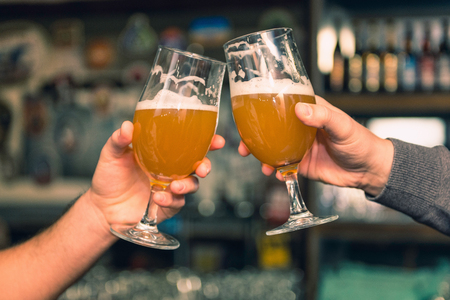An NBC News report in September 2016 stated that binge drinking is on the rise in the United States with the percentage of heavy drinkers up by 17 percent from where it was in 2005. One area where binge drinking is prevalent is on college campuses.
What is binge drinking?
Binge drinking is defined as excessive drinking over a short amount of time according to addictioncenter.org. In order to be considered a “binge,” the  drinker’s blood alcohol concentration (BAC) must reach or exceed 0.08 grams per 100 grams of blood. This usually happens when a man consumes 5 or more drinks or a woman consumes 4 or more drinks over the course of about 2 hours.
drinker’s blood alcohol concentration (BAC) must reach or exceed 0.08 grams per 100 grams of blood. This usually happens when a man consumes 5 or more drinks or a woman consumes 4 or more drinks over the course of about 2 hours.
NIH (National Institute on Alcohol Abuse and Alcoholism) says that:
- According to a national survey, almost 60 percent of college students ages 18–22 drank alcohol in the past month, and almost 2 out of 3 of them engaged in binge drinking during that same time-frame.
- About 1,825 college students between the ages of 18 and 24 die from alcohol-related unintentional injuries, including motor vehicle crashes.
Is there a direct link between college-age drinking and DUIs?
A study published in The College Student Journal in 2007 examined the relationship between social bond variables and drunk driving in a sample of 1,459 college students. The results were mixed as to the actual influence of social bonding and drunk driving. What has been shown as a link is the actual distance away from campus that drinking occurs. There is a higher probability that a student will either drive drunk or ride with someone who is intoxicated as he/she returns to campus.
What strategies are being employed to deter binge drinking?
When aiming to mitigate alcohol consumption (especially binge drinking) among college students, it takes a concerted and strategic effort from school administrators, counselors and the larger community, including local lawmakers. According to NBC and CNN news here are some of the strategies that are being used:
- A growing number of colleges are banning hard liquor on campus in a move to curb extreme drinking.
- One of the easiest and most cost-effective strategies for colleges to employ is requiring all first-year students to take a 90-minute interactive online course called AlcoholEdu, which covers all aspects of alcohol's impact on the brain, signs of a problem drinker and safety and security, such as advising students to never leave their glass alone at a bar.
- Restricting happy hours and other drinking promotions at campus area bars can also be a highly effective strategy.
- Another strategy, especially at Division I schools with large sports arenas, is prohibiting alcohol use at sporting events on campus.
- Enforcing stronger punishment of students found with alcohol in residence halls, such as instituting a two-strike or zero-tolerance system.
- Encouraging campus or local police to set up DUI checkpoints on weekends for students driving back to the campus or dormitories.
- Training resident advisors to better identify and report drinking in residence halls.
- Informing parents swiftly of their child’s illegal behaviors.
“Campus life is a special time for students many of whom are leaving home for the first time. We urge college students to take this time to become responsible citizens and not drink and drive or ride with an intoxicated driver,” said Randall Spivey of Spivey Law Firm, Personal Injury Attorneys, P.A. “Should you or a friend be injured in an accident as the result of a drunk driver, contact our experienced team. We are here to assist you.”
Hurt By Drunk Driver Attorney, Randall L. Spivey is a Board Certified Trial Attorney – the highest recognition for competence bestowed by the Florida Bar and a distinction earned by just one (1%) percent of Florida attorneys. He has handled over 2,000 personal injury and wrongful death cases throughout Florida. For a free and confidential consultation to discuss your legal rights, contact the Spivey Law Firm, Personal Injury Attorneys, P.A., in Lee County at 239.337.7483 or toll free at 1.888.477.4839,or by email to Randall@SpiveyLaw.com. Visit SpiveyLaw.com for more information. You can contact Spivey Law Firm, Personal Injury Attorneys, P.A.in Charlotte County at 941.764.7748 and in Collier County 239.793.7748.


